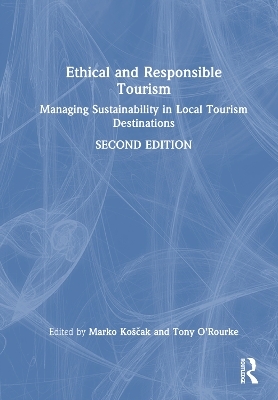
Ethical and Responsible Tourism
Routledge (Verlag)
978-1-032-41562-8 (ISBN)
Ethical and Responsible Tourism explains the methods and practices used to manage the environmental impact of tourism on local communities and destinations. This new edition takes into account recent global events such as the Covid-19 health crisis, the impacts of the war in Ukraine on tourism in neighbouring regions and the consequences of the energy and cost of living crisis.
The three core themes of the book – destination management, environmental and social aspects of ethical sustainable development and business impacts – are discussed across both topic and case study chapters, alongside explanatory editorial analysis with all chapters clearly signposted and interlinked. The case studies address specific and practical examples from a global range of examples including sites in Australasia, Central America, Europe, Asia, North America and South America. In this new edition, further case studies are included from the USA and Japan, as well as new examples from Brazil, Croatia and Malta.
Used as a core textbook, the linking of theory in the topic chapters, and practice gained through case studies, alongside further reading and editorial commentary, Ethical and Responsible Tourism provides a detailed and comprehensive learning experience. Specific case studies can be used as standalone examples as part of a case teaching approach, and the editorial and discussion elements are designed to be suitable for those simply seeking a concise overview, such as tourism professionals or potential investors in sustainable tourism projects.
This revised edition continues to be essential reading for students, researchers and practitioners of tourism, environmental and sustainability studies.
Marko Koščak held the position of Assistant Professor from 2014 to 2019 at the University of Maribor, Faculty of Tourism Brežice, Slovenia, and from 2019 in the same Faculty as an Associate Professor. He also provides professional consultancy services in regard to heritage, cultural, ethical and responsible tourism as well as working with public, private and EU organisations. Tony O’Rourke retired in 2011 and since then has taught at MSc and MBA level as a part-time and visiting Professor and also conducted advisory work for a number of ethical tourism organisations, including the Green Lines Institute for Sustainable Development in Portugal. He has also engaged in personal research on micro and small scale tourism financing.
1. Introduction and background SECTION 1: Topics; PART A: Destination Management aspects of ethical sustainable development 2. Safety and security aspects of a sustainable destination 3. Cultural and heritage tourism 4. Active and adventure tourism in the planning of local destination management 5. The challenges of integrating sustainable wine-growing into wine tourism PART B: Environmental and social aspects of ethical sustainable development 6. Slow adventure in remote and rural areas 7. Strategies for sustainable tourism in Porto 8. Terraced landscape preservation and tourism sustainability in Cinque Terre, Liguria 9. Managing Sustainability in Local Tourism Destinations at the Organisation Level PART C: The business impacts of ethical sustainable development 10. The Significance and Prospects of Including Local Food in the Development of a Sustainable Rural Tourism Destination 11. SMART Sustainable finance 12. Micro-financing a sustainable, ethical, local project 13. The economic and financial consequences for tourism 14. An assessment of the Topics SECTION 2: The case studies; PART A: Destination Management aspects of ethical sustainable development 15. The ethics of sufficiency: The Edelsbach Tulip Festival as a best practice example of sustainable event culture 16. The cycle network for ethical and sustainable tourism 17. Pandemic and Potential: How Ashland, Oregon Used Disturbance to Promote Sustainability 18. Evolution of a gentle mobility in an Alpine rural municipality: The case of Werfenweng 19. Territorial collective brands according to the "Authentic from Slovenia" model 20. Malta: Regaining a sustainable heritage 21. Japanese tourism, the Tokyo 2020 Olympic Games and COVID-19 22. Slovenian tourism since independence 23. Building success on the edge of Europe PART B: Environmental and Social aspects of ethical sustainable development 24. Climate change, tourism and rural sustainability in the Margaret River wine region of Western Australia 25. The Sustainable Garden of Pirámides de Güímar 26. Inclusivity in cultural heritage sites as a means of sustainable tourism 27. Corporate Social Responsibility in times of the pandemic, a comparative study 28. Alto tâmega: Present heritage and future prospects 29. Managerial Practices on Operations and Tourism Supply Chain during the pandemic crisis in Brazil PART C: The business impacts of ethical sustainable development 30. Queensland-Gold Coast tourism, the Japanese era 1980–1997 and single market strategies 31. Charleston’s Crisis of Overtourism and its Regulatory Response 32. From over-tourism to under-tourism 33. Sustainable Gastronomy tourism as a Tool of Local Development 34. An assessment of the case studies SECTION 3: Time to pause and reflect 35. Conclusions
| Erscheinungsdatum | 21.04.2023 |
|---|---|
| Zusatzinfo | 55 Tables, black and white; 48 Line drawings, black and white; 13 Halftones, black and white; 61 Illustrations, black and white |
| Verlagsort | London |
| Sprache | englisch |
| Maße | 174 x 246 mm |
| Gewicht | 1080 g |
| Themenwelt | Sachbuch/Ratgeber ► Sport |
| Naturwissenschaften ► Biologie ► Ökologie / Naturschutz | |
| Sozialwissenschaften ► Soziologie ► Spezielle Soziologien | |
| Technik ► Umwelttechnik / Biotechnologie | |
| Wirtschaft | |
| ISBN-10 | 1-032-41562-2 / 1032415622 |
| ISBN-13 | 978-1-032-41562-8 / 9781032415628 |
| Zustand | Neuware |
| Informationen gemäß Produktsicherheitsverordnung (GPSR) | |
| Haben Sie eine Frage zum Produkt? |
aus dem Bereich


